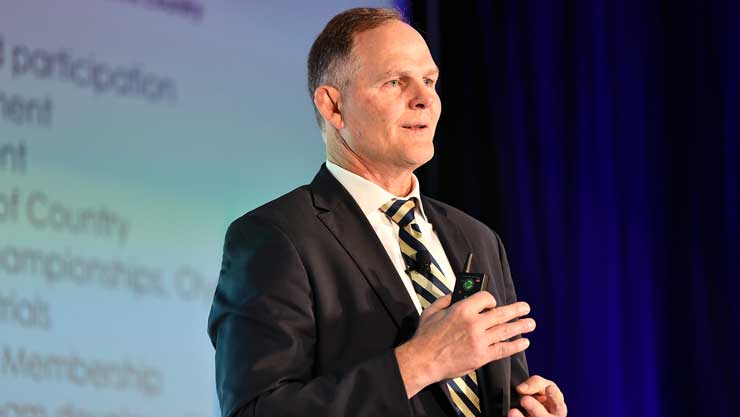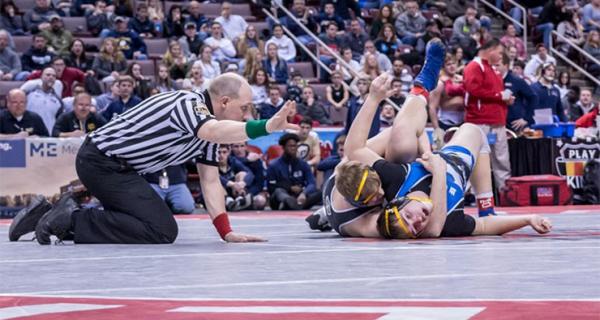Jim Scherr's Heart and Seoul
World Lacrosse CEO Jim Scherr discovered the silver lining from his Olympic disappointment.

At the 1988 Olympic Games in Seoul, U.S. freestyle wrestler Jim Scherr was less than a minute from a berth in the gold medal match of the light heavyweight division. His spot at the edge of Olympic glory was no fluke. He was an NCAA champion at Nebraska in 1984, a national champion in 1986 and 1987, won silver medals at the 1987 world championships and a bronze medal at the 1987 Pan American Games.
Scherr had won his first four bouts in Seoul, the fourth by a 15-0 decision. He led Japan’s Akiro Ota comfortably when Ota caught Scherr trying to score more points and pinned him. Scherr won his fifth-place match, leaving Seoul with a 5-1 record and no medal.
“Not as well as I would’ve liked,” is how Scherr describes his Seoul experience.
USA Wrestling Executive Director Rich Bender, one of Scherr’s best friends and a professional colleague since the 1990s, adds a little perspective to the moment.
“It’s not a stretch to think that was one of the more significant heartbreaking losses we’ve experienced as a country, not to mention what it meant to him,” says Bender. “Words can’t describe what it felt like for Jim, but I know the entire wrestling community ached for him.
“Wrestling has a way of reaching deep down and pulling your guts out. His experience at the games was one of those times and still stings to this day.”
Off the Mat
The sport that squashed Scherr’s heart also taught him how to recover from devastation, and his role as the head of World Lacrosse is the latest testament to how Scherr moved forward after Seoul.
After surgery to fix multiple injuries he wrestled through in Seoul, he won the U.S. title again in 1989, and another silver at the 1989 world championships. In a 1989 five-country round robin tournament dual with the U.S.S.R., Scherr helped rally the Americans to a 19-18 win with his defeat of a Russian who had never lost an international match.
His off-the mat career began about the same time, and after another injury at the 1996 Olympic trials, Scherr focused full time on administration. USA Wrestling’s board asked him to help it out of financial trouble. When he did, he became executive director for 10 years. That led to a nine-year stint as CEO of the United States Olympic Committee.
After pit stops in college hockey, the Baku European Games and wheelchair basketball, Scherr became the CEO at World Lacrosse. A main focus of his task is to qualify lacrosse as an Olympic sport. Scherr helped wrestling when it was in danger of being dropped from the Olympics; in 2013 it won spots at the 2020 (now 2021) and 2024 Games.
“Jim was front and center and one of the first calls we made in terms of putting together a leadership team and a group of individuals that could put the strategy together that saved the Olympic sport,” says Bender. “That experience and the relationships he’s built will be incredibly valuable to the international lacrosse effort as they move forward to hopefully be successful and gain that Olympic status.”
Gains From Loss
Scherr says his wrestling roots have served him well. It’s a humbling sport, and one of the toughest to excel in. Competitors have to maintain not only their talent and skills, but their weight. It’s a lifestyle like few other sports.
“Everybody fails at some point,” he says. “The one thing you learn is how to deal with failure and how to learn from failure and most importantly how to persevere, how to not give up. The other thing I learned from failing on the biggest stage is if you’re competing in sports to win a medal, if you’re only doing your job to get a paycheck, if you’re only in a relationship for what you get out of it, ultimately the experience is going to be less meaningful for you and less successful.
“At the end of the day it’s not about whether you take home a medal, because those fade and tarnish pretty quickly, what it’s about is what you learn and gain personally through the experience and your connection to others through the experience and how you’re impacted by others and how you impact others.
“It’s the journey, not the destination.”








